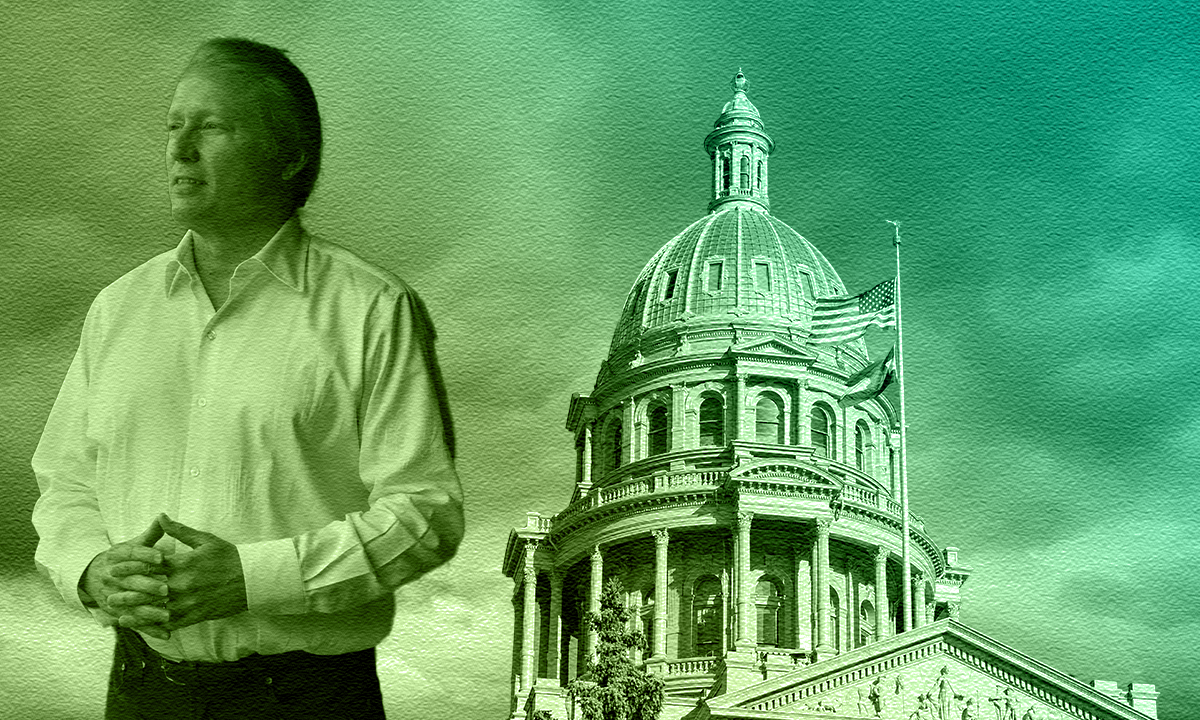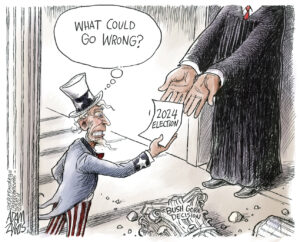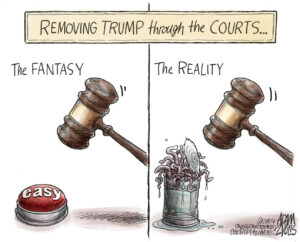The Push for Open Primaries Is a Plutocratic Ploy to Buy America
Under the banner of voting reform, a tycoon’s plan could give the rich even more power to buy elections. Graphic by Truthdig
Graphic by Truthdig
The following article was first reported and published by The Lever, a reader-supported investigative news outlet that holds the powerful accountable.
It is intimidatingly early on a Friday morning and I’m inside the bright-white Denver headquarters of Unite America, a “philanthropic venture fund” dedicated to radically reshaping the way we elect our public officials. The walls are splashed with slogans in red and blue reading things like “Country Over Party.” Depictions of the Statue of Liberty are omnipresent. A bubbly employee repeatedly offers me a bagel.
Nick Troiano, Unite America’s executive director, walks in looking abundantly boyish in khakis and a neat haircut. At 34, Troiano fronts an organization that has spent more than $70 million since 2019 pushing through electoral reforms. Unite America’s core demands are open primaries, meaning one non-partisan primary open to all candidates, and ranked-choice voting, where voters rank all eligible candidates in order of preference.
When these reforms are passed, Unite America contends, they boost moderate candidates that appeal to an “exhausted majority” of centrist voters alienated by current modes for extremism within the Democratic and the Republican parties. While the reforms may sound anodyne, Unite America is not humble in its aims: To Troiano, this is about nothing less than the salvation of our nation.
America has a “partisan polarization problem” that has become a “threat to our democracy itself,” Troiano says. “Our trust in institutions, our ability to hold free and fair elections, the rule of law” — all are under threat. In order to protect those hallowed values, Unite America is “engaged on the proverbial field of battle” fighting “the status quo that the political establishment want to protect in service of their own power.” This work is “existential in nature.”
But critics fear that reforms like the ones pushed by Unite America are, in actuality, a path to possible plutocracy. Opponents say that under the guise of saving democracy, Unite America wants to mute the power of political parties altogether, and what that may leave is a playing field ostensibly open to all but in reality quickly dominated by the ultra-rich. Lee Drutman, Senior Fellow at the left-of-center think tank New America, has argued that under open primaries, parties “become brands anybody can purchase for enough money.”
Thiry is part of a network of tycoons pushing open primaries and ranked-choice voting nationally.
One of Unite America’s most prominent boosters is the co-chair of its board: Kent Thiry, a Three Musketeers obsessive and the former CEO of DaVita, the Denver-based dialysis giant that has paid out nearly $1 billion in settlements since 2012 in lawsuits alleging everything from Medicare fraud to wrongful deaths.
Thiry and Unite America’s current pressing concern is their joint homebase, Colorado, where they are pushing a constitutional measure for the November ballot that would bring open primaries and ranked-choice voting to elections statewide beginning in 2026, from the state legislature and governor to the U.S. senate.
Thiry is part of a network of tycoons pushing open primaries and ranked-choice voting nationally. Collectively, they’ve spent millions boosting Unite America and pushing lookalike ballot measures in Massachusetts, Oregon, New York, Maine, Alaska, Nevada, and now Colorado. Thiry says his goal is to take this billionaire-backed election reform push and turn it into “a true movement” like “civil rights, like gay marriage, like #MeToo.”
States have wide leeway to run their elections however they want. For a group like Unite America and its wealthy backers, then, spending millions to push election reform ballot measures state by state is a gradual but enormously impactful way to tilt the axis of the country’s political system. If Thiry gets his way in Colorado, his strategy could well become a blueprint for wealthy power brokers nationwide.
Ellen Dumm is a Colorado communications consultant who specializes in election reform. She’s also part of a local crew that has sprung up to resist Thiry’s measure. A “cabal of election nerds,” Dumm jokes. The group is gravely alarmed by the potential impacts of Thiry’s reforms — above all, the possibility that Thiry is setting the stage to make it easier for himself to run for Governor in 2026.
On March 6, Colorado’s Title Board, a non-partisan three person panel with jurisdiction over ballot measures, will hold a hearing to evaluate Thiry’s proposed reform. The cabal and its lawyers will be there, hoping to stop the measure before it ever makes it to the ballot.
“The changes, taken together, would make it easier for powerful, wealthy people to control elections,” Dumm says. “And Unite America, obviously, has boatloads and boatloads of money.”
The Alaska-fication Of America
Born and raised in Milford, Pennsylvania, Troiano says he’s always had an “affinity towards civic engagement,” to “leaving a community better than how you found it.” Smiling, he adds, “I joined student council in second grade and it’s been a snowball rolling downhill ever since.”
In 2014, then fresh out of Georgetown, he switched his affiliation from Republican to Independent to run for a Pennsylvania House of Representatives seat, managing an admirable 13 percent of the vote at 24 years old.
Soon after, he joined the Centrist Project, a group founded by Dartmouth professor Charlie Wheelan that originally focused on helping elect self-described “moderate” candidates. In 2018, the Centrist Project re-branded as Unite America and then began shifting to a more ambitious goal: reforming electoral systems nationwide.
As Unite America’s executive director, Troiano tells me, “I have the fortune of being in a position to do something good for the country as a whole. That’s not just an opportunity, but a responsibility.”
In February, Troiano published a book, The Primary Solution, which promises to save “our democracy from the fringes.” It featured promotional blurbs from Michael Bloomberg, Andrew Yang, and Arnold Schwarzenegger (“This book offers thought-provoking ideas to terminate polarization and extremism in America”). In the book, Troiano writes that “abolishing partisan primaries” is “the single most important thing we can do” to hold the government “accountable to delivering better results.”
Troiano generally avoids specifying what those actual desired results are. He shares that he’s worried about the national debt and that his parents voted for Obama in 2008 and Trump in 2016. Mostly, though, his sales pitch is full of vague paeans to unity and reconciliation. It is well-honed, emotional, and undeniably effective.
“The largest and fastest growing segment in the electorate are people who don’t belong to either political party,” he tells me. “You wouldn’t necessarily know that by the constant maps of red and blue — but this is a country of purple.”
Troiano cites proprietary Unite America research that shows a disproportionate number of independents who don’t participate in partisan primaries are young people and military veterans.
Unite America spent over $3 million backing Alaska’s reform, the original impetus for this current swell of reforms.
“It’s stunning that we’re telling the people who fought for our country and who are the future of our country, ‘You don’t get to have a voice in who our leaders are,’” he says. “It’s wrong, on its face.”
In 2020, Alaska adopted open primaries and ranked-choice voting. In the first cycle of elections after the reforms, former Republican Vice Presidential nominee Sarah Palin lost a race for a House seat to a Democrat and Republican Lisa Murkowski defeated a more right-wing challenger to hold on to her Senate seat.
In the wake of those results, the system was widely praised for boosting moderates just as its backers had promised. (Some pundits also pointed out that those results were most likely under a traditional electoral system, too.)
In November 2024, Troiano points out, “half a dozen states might take” Alaska-style initiatives “to the ballot to reform primaries.” In Arizona, Montana, South Dakota, and Idaho, measures are moving forward through the process of getting on the ballot. In Nevada, an Alaska-style measure is already on the ballot.
The Nevada measure’s backers have spent more than $20 million pushing it forward. Those backers include Kent Thiry’s Unite America co-chair, Kathryn Murdoch, Rupert Murdoch’s daughter-in-law; Kenneth Griffin, the hedge-fund billionaire and GOP megadonor; Katherine Gehl, a scion of the food manufacturing giant Gehl Foods; and Action Now, a group founded by another activist hedge-fund billionaire, John Arnold. Gehl, Murdoch, and Arnold’s Action Now also donate directly to Unite America.
Unite America spent over $3 million backing Alaska’s reform, the original impetus for this current swell of reforms. Within a decade, Unite America hopes to get a majority of the states to follow Alaska. Troiano says that will “enfranchise or empower millions of more voters” and will “liberate dozens of U.S. representatives and senators to govern to do what we hire them to do — work with each other to solve the major problems that the voters care about.”
“The 800-Pound Gorilla Of The Ballot Process”
Ellen Dumm’s “cabal of election nerds” represent a spectrum of political voices — from mainstream Democrats to activist lawyers — that collectively believe Alaska-style reforms in Colorado will have one impact that Unite America doesn’t ever mention: Wealthy candidates will gain massive advantages.
If all of Thiry’s proposed reforms are approved, the only way candidates in Colorado could get on ballots would be by collecting signatures. While that sounds democratic, in practice it means paying signature collectors who go out into the field and solicit signatures directly from residents throughout the state, and that’s hugely expensive. Getting as few as 8,000 signatures can cost as much as $120,000.
If all of Thiry’s proposed reforms are approved, the only way candidates in Colorado could get on ballots would be by collecting signatures.
Many of Dumm’s allies in the cabal first met while pushing a suite of reforms in 2013 aimed at making voting in Colorado as accessible as possible. A little over a decade later, they reconnected to push back against Thiry. The group jokes that it’s kind of like getting the band back together.
Shad Murib is one of Dumm’s allies in the push against Thiry’s ballot measure. He was born and raised outside of Denver to parents who emigrated from Lebanon; he owns a ranch where he raises Scottish Highland cattle for beef. He’s also the head of Colorado’s Democratic Party. Speaking of Colorado’s current election systems, he swells with pride.
“Every hurdle you could put in front of somebody to make it harder for them to vote — we’ve removed those,” he says.
Of the system that Thiry is proposing, Murib says, “Well-funded special interests are gonna love this system. Political consultants are gonna love this system. People are gonna make a lot of money off of the gamification of our elections. The grifters in this business are so excited by this.”
Murib’s fears of “gamification” are bolstered by the recent history of manipulation of ranked-choice voting and open primaries — also known, due to their chaotic nature, as jungle primaries — in California. In the current race for a Senate seat, Rep. Adam Schiff (D-Calif.) is spending money to boost the name recognition of a weak Republican opponent in hopes that the underdog beats out Schiff’s closest in-party competitor, and provides Schiff an easier road to victory. As University of California-San Diego professor Thad Kousser has written, “Welcome to the jungle primary, where races can become more about strategic fights and less about battles of ideas.”
The Colorado Title Board evaluates whether a proposed ballot measure is limited to a “single subject,” meaning its focus is limited to one single reform. To navigate the Title Board’s careful vetting, Kent Thiry has hired a gaggle of attorneys from a massive corporate law firm, Brownstein Hyatt Farber Schreck, who are currently pushing application after application through the Title Board.
Scott Wasserman is the president of the Bell Policy Center, which focuses on economic mobility issues in Colorado, and a longtime critic of Thiry’s political actions.
“You can flood the ballot process and eventually get your title,” Wasserman says, “if you have $5 million and a dream.”
Along with Brownstein, Thiry is also using a consulting firm, the 76 Group, which is run by Josh Penry, a former Republican member of the Colorado State Senate, to help him push through his measure. Penry is widely seen as Thiry’s well-compensated right-hand man in his quest to reform Colorado politics. In 2020, Penry bragged to KFF Health News that Thiry is “the 800-pound gorilla of the ballot initiative process in Colorado.” The former CEO, Penry added, “wields more power in an informal way than virtually all the elected officials.”
Getting through the Title Board is a mundane and technical process with huge ramifications: Once measures pass the Title Board, a wealthy backer like Thiry can spend the millions needed to pay the collectors to amass the 124,000 signatures needed to get on the ballot. Once the measure is on the ballot, Thiry can again spend freely, running ads that promote the measure to the voters in order to get over the 55 percent threshold to pass the measure into law.
“Well-funded special interests are gonna love this system. Political consultants are gonna love this system. People are gonna make a lot of money off of the gamification of our elections.”
At the March 6 Title Board hearing, Dumm and the cabal of election nerds will be represented by the self-described “progressive law firm,” Tierney Lawrence Stiles. (The same law firm was involved with the failed legal challenge to keep Donald Trump off Colorado’s presidential ballot.) They’re hoping to convince the Board that Thiry’s measure would reform Colorado election law far beyond its stated aims and that it should not be approved as a single ballot measure.
Dumm has actually worked directly with Thiry before, during a 2018 redistricting process. When I ask what he’s like in person, she says she never wanted to “crawl inside that brain.”
A few days later, she emails me a follow-up response: “To steal a line from Humphrey Bogart, he’s just like every other man, but more so.”
Kent Thiry’s Business Of Blood
Before Thiry took on Colorado politics, he ran a big business for people’s dying kidneys. DaVita and its competitor Fresenius make up the duopoly that controls dialysis, a treatment for severe kidney disease, throughout the United States. As our population ages, and as chronic kidney diseases become more prevalent, the global dialysis market is forecasted only to rise and rise. In order to boost its bottom line, DaVita has earned a reputation for providing medical care so shoddy that it regularly endangers patients’ lives.
Kent Thiry announced he was moving DaVita from California to Colorado in 2009 after the company was promised more than $6 million in economic incentives both from the state of Colorado and the city of Denver. DaVita’s world headquarters — allegedly known as “Casa del Mundo” by its employees — now dominate Denver’s skyline.
(When I asked a spokesperson for Colorado Governor Jared Polis what benefits the state of Colorado saw in return for the incentives given to DaVita, they responded only to say that “no state tax credits have been provided to DaVita since Governor Polis took office,” in 2019.)
Since the relocation to Colorado, and all while under Thiry’s control, DaVita has strung together a long list of massive legal settlements.
In 2014, via the Department of Justice: “DaVita paid $350m to resolve allegations… it gave illegal kickbacks to physicians who referred patients to DaVita” including “non-disparagement agreements that would have prevented the physicians from referring their patients to other dialysis providers.”
Since the relocation to Colorado, and all while under Thiry’s control, DaVita has strung together a long list of massive legal settlements.
In 2015, via the Department of Justice: DaVita “has agreed to pay $450 million [for] creating unnecessary waste in administering the drugs Zemplar and Venofer to dialysis patients, and then billing the federal government for such avoidable waste.”
In 2018, via Reuters: “A federal jury in Colorado has awarded $383.5 million to the families of three patients who said they suffered cardiac arrests and died soon after receiving dialysis treatments at clinics run by DaVita Inc.”
In How to Make a Killing: Blood, Death and Dollars in American Medicine., an exposé of DaVita and the larger dialysis industry, the investigative reporter Tom Mueller writes that the settlements are an integral part of DaVita’s business model: “All manner of flagrant misconduct, including serious criminal charges, is routinely resolved by the payment of a legal settlement, which often represents a fraction of the money that the firm made during the period of the alleged fraud.”
In the same year as DaVita’s settlement in the wrongful death lawsuit, a ballot measure in California, Proposition 8, aimed to improve care for dialysis patients and conditions for dialysis workers by capping dialysis companies’ revenues at 115 percent of costs to deliver care, with earnings over that amount being rebated back to patients.
Prop 8 was promoted by SEIU, the union that represents healthcare workers in California. In How To Make A Killing, Mueller writes that during the fight over Prop 8, Thiry internally “reviled labor unions as un-American” and “affirmed his firm’s right to dictate all aspects of dialysis care.” Thiry and his allies spent $110 million to kill Prop 8, and in the process set a national record for spending on ballot measures.
In 2021, Thiry himself was indicted by the Department of Justice on charges that he colluded with other healthcare companies not to solicit each others’ employees in order to quash the workers’ earnings and opportunities. In 2022, he was acquitted of all charges and duly continued his pattern of shrugging off his company’s legal troubles.
A blandly handsome native Wisconsinite, Thiry cultivates a milquetoast outward persona. His Twitter bio partially reads “Love being a father of two.” When speaking to the press, Thiry sticks to mild Unite America-style talking points. He declined my repeated requests for an interview, instead sharing a statement: “Elections belong to voters — not political parties. I strongly support efforts to bring truly open primaries to Colorado because voters have a right to choose any candidate in any election and they have grown weary of insiders gaming the system.”
That milquetoast persona is belied by Thiry’s personal idiosyncrasies. As The Denver Post reported in 2009, Thiry began rallying his workforce by utilizing the slogans and imagery of the classic 1844 Alexandre Dumas novel The Three Musketeers after watching the 1998 Leonardo DiCaprio musketeer movie The Man In The Iron Mask.
“I looked over, and tears were rolling down his face,” a coworker and friend, Doug Vlchek, recalled to the Post. “That’s the guy who is passionate about what he is doing, whether it’s making a difference at work or watching a movie.”
Thiry has happily posed for press photos at the DaVita office in front of a mural depicting big old hats with feathers and swordsmen and other signifiers of musketeer culture. In Denver, Thiry is known for hosting parties at his large and lovely home in the city’s affluent Cherry Hills neighborhood. Once, mid-party, he promised a large donation to the charity of choice to whoever stayed cutting it up on the dancefloor the longest. One partygoer told me he’s spotted a mannequin wearing a Three Musketeers outfit on display in a room in the house. Another recalls Thiry standing up in front of a party crowd and reciting, from memory, the Gettysburg Address.
“DaVita paid $350m to resolve allegations… it gave illegal kickbacks to physicians who referred patients to DaVita.”
In 2017, Last Week Tonight With John Oliver devoted an entire episode to breaking down DaVita’s exploitative business practices and personal quirks — and utilized, to great effect, footage from internal DaVita conferences in which Thiry does barefoot tumble rolls to Bob Seger while dressed like an old-timey swordsman.
When the John Oliver segment aired, Thiry was exploring a run for Colorado governor. Within months, he announced he would not enter the race. (While considering running, Thiry switched his party affiliation to Republican from unaffiliated; after giving up the idea, he switched back.) The language he used alarmed many in the cabal of election nerds that, ever since, he’s only been waiting for a more opportune time to try again.
He told reporters, “I have held onto the dream of running for office since I was 10 years old.”
What Does Kent Thiry Really Want?
I meet Wendy Howell, the state director for the Colorado chapter of the Working Families Party, in the conference room of a beguilingly brutalist office building across from the State Capitol. A cheery and pugnacious speaker, Howell represents the left-flank of the cabal.
“Given that our North Star is building governing power for the multiracial working class, we tend to look at any kind of shift in the rules around elections with a pretty hard eye,” Howell says.
Howell points out that, in the era of MAGA Republicans, a “corporate Republican” like Thiry would have a very tough time making it through a Republican primary. Under an open primary system, though, Thiry would have a much better chance of outspending the competition and forcing his way forward. Echoing a sentiment I’d hear again and again in Denver, Howell suggests Thiry is ultimately shifting the landscape to favor his own political aspirations: “This is a billionaire who is trying to game the system so he can run for governor in 2026.”
Howell takes a well-timed comedic pause, then locks back into her flow: “And I’m sorry but Kent Thiry is a ridiculous human being. This is a man who literally rode into his employee meetings on a horse in a Three Musketeers costume. If he were anyone but a billionaire, he would be the weirdest neighbor you have. He has no business having as much access to power as he does.”
“If you’re going to completely rework the entire election model, you should have conversations with the people that do the work.”
Colorado’s elections have a reputation for high voter turnout, transparency, and security. The 2013 reforms shepherded by members of the cabal have only improved that reputation. A 2016 Pew poll of Colorado voters showed more than 90 percent approval in the system. Pew also found that the cost of the government processing a single vote had dropped from $16 to less than $10 after the reforms.
Underpinning Colorado’s electoral system’s “gold standard” reputation are its well-respected county clerks. They’re the ones who actually count the votes. And they don’t usually like to make a fuss. But soon after Unite America and Thiry began pushing their election reform measure, Colorado’s clerks began speaking up. After attending one Title Board hearing on Thiry’s measure, Chaffee County Clerk Lori Mitchell told local media, “This would throw a grenade right in the middle of our election model.”
Mitchell’s friend Carly Koppes is the clerk of Weld County, just north of Denver.
“We weren’t spoken to at all,” Koppes says to me. “And we are the ones that run elections. If you’re going to completely rework the entire election model, you should have conversations with the people that do the work.”
Koppes says she’s most concerned about voter confusion leading to a loss of faith in the system.
“What we’ve been dealing with since 2016, and it increased after 2020, is voter mistrust,” she said. “And when you ask people about ranked-choice voting, they are very confused.”
Thiry also has local critics on the far right, including Rep. Lauren Boebert (R-Colo.), who’s called his proposed reforms a “scheme launched by well-moneyed interests.” According to Rolling Stone, nationally, ranked-choice voting has been opposed by arch-conservative activist Leonard Leo’s Honest Elections Project.
Unite America’s stated aim is to root out “radicals” from both parties. In his book, Troiano takes aim at both “MTG” — Rep. Marjorie Taylor Green (R-Ga.) and “AOC” — Rep. Alexandira Ocasio-Cortez (D-NY), implying they’re equally nefarious forces in American politics. As the cabal interprets it, one of Thiry’s end goals is to boost more corporate-friendly candidates, whether they’re Republicans or Democrats.
Dumm says the cabal is not opposed to changes to Colorado’s election system. In fact, Dumm points out, “every year we learn something, every cycle the voting population changes, and every year, we go to the legislature with clean-up bills to stay as close as we can to the cutting edge of the best in the nation.”
But if Thiry were able to cement Alaska-style reform in Colorado’s constitution, Dumm says, “we couldn’t do that. It’s a bullying tactic: ‘It’s mine, I’m going to put it here, nobody can change it.’”
Kent Thiry’s Fight For Humanity
Unite America sells its reforms as being good for generating more “moderate” candidates and less “radical” ones. But as Unite America’s critics point out, the definitions of “moderate” and “radical” are in the eye of the beholder. To Scott Wasserman, of the Bell Policy Center, a “moderate” candidate who is against raising taxes on the rich would actually be quite “radical” to millions.
Under the widespread utilization of open primaries, the efficacy of political parties may wane. In Colorado, that may mean that a candidate like Kent Thiry could run for higher office without ever really needing to say anything about what he believes in.
“Will voters ever hear Kent Thiry’s views on taxes?” Wasserman asks.
In his current iteration as an electoral reformer, Wasserman points out, Thiry “fashions himself as [someone] who cares about democracy and civic society. Okay, cool. Then we should have a commitment from you that you are not gonna run for governor under this. You should not be able to create a new election system that then enables you to rise to power.”
As Nick Troiano sees it, though, Wasserman and the rest of Thiry’s critics have it all wrong. He tells me that Thiry is actually unfailingly selfless. In fact, Troiano says, he had to plead with Thiry for “years” to join Unite America’s board.
Thiry “could be spending money on any number of other things and avoiding any scrutiny,” Troiano says as we sit in Unite America’s cheery office. “And what I really admire about Kent is how serious he takes his commitments of citizenship, in wanting to do this for the voters.” He’s committed to “the cause,” to “making our democracy better.”
For Troiano, “He’s a role model. Most rich guys are on a yacht. They’re not doing anything for humanity.”
Your support is crucial…With an uncertain future and a new administration casting doubt on press freedoms, the danger is clear: The truth is at risk.
Now is the time to give. Your tax-deductible support allows us to dig deeper, delivering fearless investigative reporting and analysis that exposes what’s really happening — without compromise.
Stand with our courageous journalists. Donate today to protect a free press, uphold democracy and unearth untold stories.






You need to be a supporter to comment.
There are currently no responses to this article.
Be the first to respond.